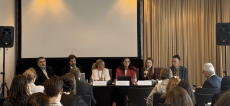
Public Defender addressed the Committee of Ministers on Freedom of Religion Issues
On August 19, 2019, Public Defender of Georgia addressed another Communication to the Committee of Ministers of the Council of Europe. Communication relates to the implementation of judgments on Identoba Group (Identoba vs. Georgia, Begeluri and others vs. Georgia and Members of Gldani Congregation and others vs. Georgia). Namely, it addresses systemic problem of homophobia, transphobia and xenophobia in the country, as well as gaps in the legislation of Georgia and its practice related to the effective investigation of hate crimes.
Among other problematic issues, the Public Defender overviews the hostile environment against different religious groups and ethnic identities in Georgia and evaluates the work of the State Agency for Religious Issues.
According to the Ombudsperson xenophobia can be seen as a systemic problem, as far as organized xenophobic groups have been operating in Georgia for years and a number of politicians are constantly stirring up hatred towards different religious and ethnic groups by media and social networks, as well as by public demonstrations. Particular targets in this regard are Iranian Arab, Indian, Turkish, African people, Muslims and Jehovah's Witnesses, who have repeatedly been subjected to physical assault and discrimination.
Public Defender underlines the problem of insufficient Institutional guarantees for freedom of religion. For years the following problems have not been solved: returning historical property, violations and unequal environment in the educational field, obstacles related to religious communities’ constructions, and effective and timely investigation of crimes committed on account of religious intolerance.
Furthermore, hatred and intolerant rhetoric against persons with different religious or non-religious convictions are expressed in the political context, media and social networks. For religious minorities, it is mostly impossible to use public space and media.
Problematically, the Human Rights Action Plan assigns the issues related to the freedom of religion to the State Agency for Religious Issues, which has been the subject of criticism from religious associations and non-governmental organizations since the State Agency does not fulfil its commitments. It should be further underscored that the work of the State Agency is evaluated by a number of religious associations as unsatisfactory or negative. In addition, local NGOs working on religious issues such as TDI and EMC, and Public Defender's Center for Tolerance, have repeatedly criticized this body. They believe that the State Agency is not committed to the protection of freedom of religion in the country; on the contrary, it seeks to fulfill the function of controlling religious organizations.
It is also noteworthy, that the State Agency has never expressed its position on violations of freedom of religion. As for the inter-religious forum within the State Agency, positive aspects of its work are unknown. In addition, in its report on Georgia (fifth monitoring cycle), European Commission against Racism and Intolerance (ECRI) recommended that the Georgian authorities scale up their support for the Council of Religions, which operates under the auspices of the Public Defender’s Tolerance Centre. The authorities should in particular task the newly created State Agency for Religious Issues to cooperate with the Council of Religions and utilize the Council’s expertise and recommendations in order to tackle the problem of religious intolerance. Despite this recommendation, during its functioning, the State Agency never initiated a meeting with either the Council of Religions or the Center for Tolerance which coordinates the Council of Religions and works on religious freedom issues. ECRI therefore considered that this recommendation has not been implemented.
The Public Defender pays attention to the problems of investigation of hate crimes. The ombudsperson welcomes establishment of Human Rights Department at the Ministry of Internal Affairs in 2018, however regrets that recommendations of ECRI and Public Defender were not taken into account the Department to be equipped with the investigative mandate.
According to information provided by the Prosecutor's Office in August 2018, cases of investigations into alleged discriminatory motivated crimes have improved both in terms of correct qualification and in identifying hate crimes, although identification of the hate motive is still problematic in many cases. Another problematic issue is that the cases examined by the Public Defender show that lack of sensitivity on the part of the law-enforcement officials and absence of special procedures for interviewing victims of violence in police stations remain troublesome.
The Public Defender’s practice shows that ethnic and racial intolerance remains to be an acute problem in the country. In this regard, the murder of Vitali Safarov motivated by xenophobia was particularly alarming.
On its session planned in September, Committee of Minister will discuss fulfillment of its commitments by Georgia and examine its individual and general measures undertaken for the enforcement of the judgments of the European Court of Human Rights. Identoba Group cases includes three judgements of the Euruopean Court on freedom of religion and discrimination in Georgia, namely: 97 Members of the Gldani Congregation of Jehovah’s witnesses And 4 Others v. Georgia, no. 71156/01 Begheluri and Others v. Georgia, no. 28490/02 Tsartsidze and Others v. Georgia, no. 18766/04. These cases are related to the mass persecution and violence against Jehovah’s Witnesses in 1999-2001. As the government of Georgia did not fulfil its obligation to protect the victims of violence, the Court found violation of Article 9 (Freedom of thought, conscience and religion) taken separately and in conjunction with Article 14 (prohibition of discrimination).
Photo: coe.int







